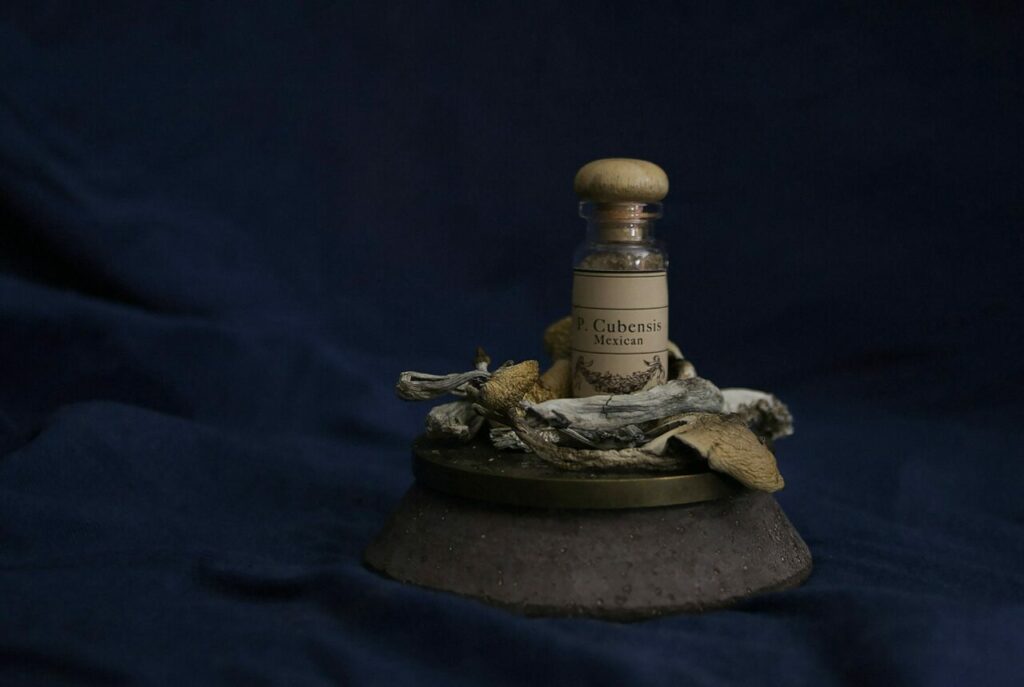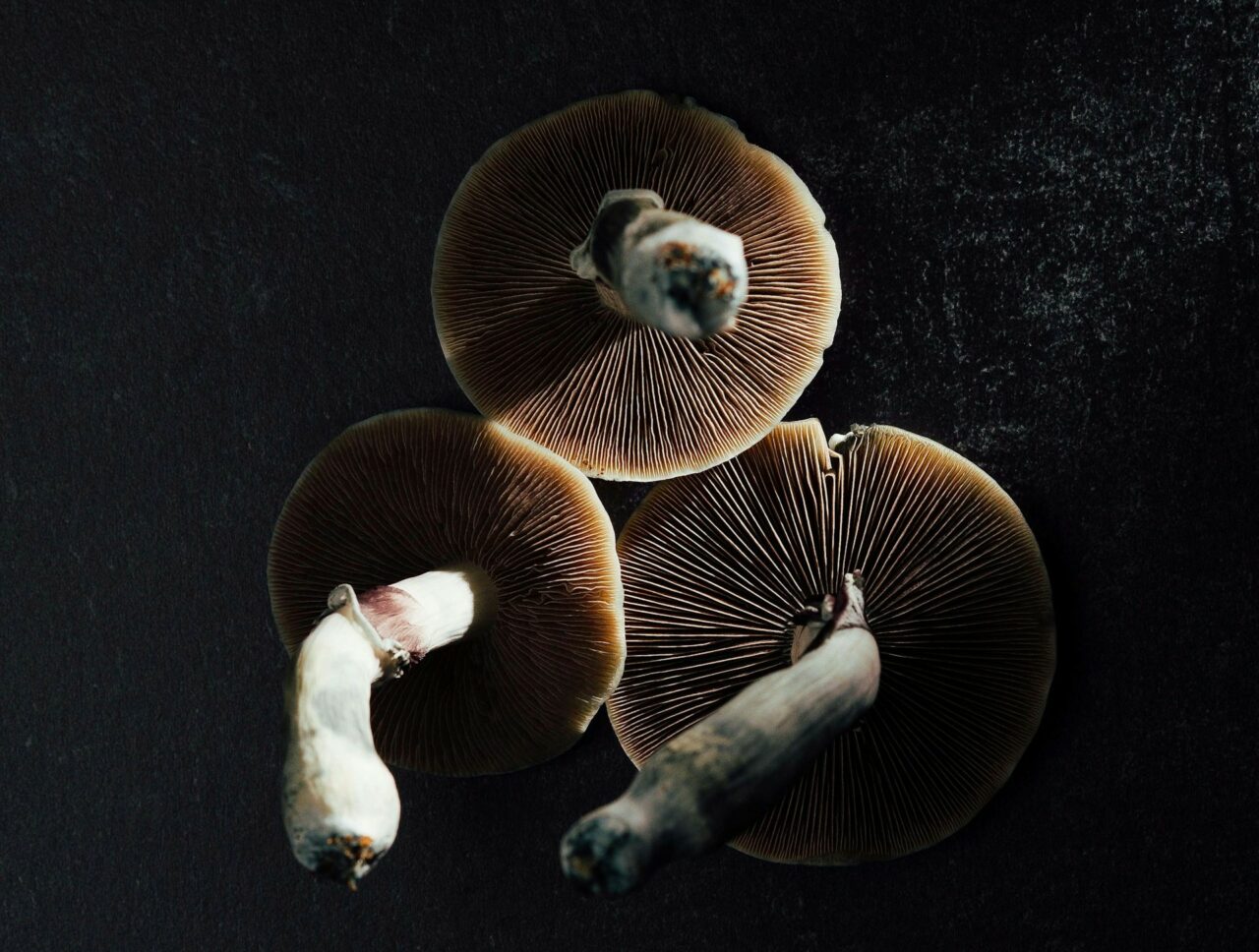As the fascination with natural magic mushrooms in Canada escalates, there’s a concomitant increase in the demand for lab-created psilocybin products. Many researchers favor these due to their guaranteed dosages. However, they might not realize that natural mushrooms could have a higher potency than their synthesized equivalents. Experts underscore the substantial differences between them, including disparities in strength.

Key Takeaways:
- More than 180 species of natural mushrooms present varying potencies, which are influenced by factors like species, consumption method, cultivation, and personal tolerance.
- Lab-made psilocybin, a synthesized version of the natural compound, is created in controlled environments to maintain consistency and purity. This is especially beneficial for clinical research, primarily in mental health therapy.
- The combined effects of various compounds in psychedelic mushrooms, such as psilocin and baeocystin, can lead to a more powerful and profound experience compared to a single compound alone.
Surging Market: Different Forms of Psychedelics
Psilocybin mushrooms are rapidly gaining popularity in Canada, particularly for the treatment of specific mental health disorders like OCD, depression, PTSD, and anxiety. In response to this growing interest, provincial governments are pondering over the decriminalization of their recreational usage.
In 2020, Canada allowed restricted medicinal use of these mushrooms under certain circumstances. As recently as last year, the federal government permitted specific terminally ill patients to use these substances to alleviate their symptoms.
These forward-thinking policies have led to the rise of synthetic psychedelics.
The Ongoing Conversation
The continual discourse on organic versus lab-generated psychedelics revolves around safety, accessibility, and expense.
Many argue that natural psychedelics provide a more comprehensive and traditional experience. Conversely, supporters of lab-created versions emphasize their suitability for medical application due to easier standardization, guaranteed dosage control, and quality assurance.
While lab-made psychoactive substances could increase accessibility, there are ongoing concerns about potential monopolization in the drug market. Critics warn this could lead to less accessibility and higher costs for users.
Comprehending Psilocybin: A Comprehensive Guide
Psilocybe cubensis, a type of magic mushroom, is among the many naturally existing psychedelic substances present today. Magic mushrooms, recognized for their psychoactive properties, come in various strains like Golden Teachers, Amazonian Cubensis, Blue Meanies, and others, with Psilocybe cubensis being the most notable family.
Deciphering the Psychedelic Journey
Psilocin, derived from these mushrooms, transforms into a different chemical when metabolized by the liver. This resulting compound interacts with the brain’s serotonin receptors, particularly the 5-HT2A receptor.
This receptor is instrumental in mood management, cognitive functions, and perception. Its interaction with the metabolized compound alters the normal functioning of serotonin pathways, leading to changed visual and auditory perception, shifts in thought processes, and emotional states. This experience results in elevated mood, enhanced creativity, introspection, and the distinctive “psychedelic” experiences.
Two Main Categories
| Natural | Found in more than 180 species of fungi, the strength varies depending on the mushroom species. Psilocybe cubensis is a prevalent variety. The effects can vary based on methods of consumption, cultivation practices, and individual tolerance. |
| Synthetic | Produced in labs and chemically identical to natural compounds. They are synthesized in controlled environments to ensure uniformity and purity. These are increasingly being researched for clinical uses, particularly in the sphere of mental health treatments. |
Comparing Nature’s Offering and Science’s Innovation: The Fundamental Differences
Natural versions of these substances are found in certain species of magic mushrooms. Indigenous communities in North and South America traditionally used these mushrooms in their rituals and ceremonies, deeming them holy or divine.
- Obtained from plants and mushrooms
- Employed in ancient rituals and healing methods
- The unique genetic makeup of each strain determines its effectiveness
On the other hand, the
A synthetic drug is
A substance that mimics the natural chemical structure of a specific compound to a high degree. These drugs are precisely produced by experts in regulated settings to maintain precision. Despite behaving similarly to natural drugs, they can alter the overall psychedelic experience.
- Produced by proficient pharmaceutical experts
- Modern developments aimed at medical uses
- Defined potency due to the standardized manufacturing process
Natural substances offer additional benefits because of their bioactive ingredients. Various types of mushrooms can have differing amounts of psilocybin and other compounds, resulting in varied effects.
Researcher Insights
An experiment carried out at the Hebrew University showed that psychedelic mushrooms have a more potent and enduring effect on synaptic plasticity than their synthetic counterparts. The research team studied the drug’s influence on the brain activity of mice by tracking behaviour changes and specific brain chemicals.
The study revealed that the extract reduced head twitches and promoted the formation of new brain connections. This suggests that the mushroom extract could offer more advantages than a single compound.
The researchers also introduced the idea of the “entourage effect”. They described it as the event in which the joint impact of multiple compounds in psychedelic mushrooms could be more potent than the effects of separate compounds. In the case of mushrooms, psilocin, baeocystin, and other tryptamines might cooperate to create an intense experience.
These extra chemicals are absent in lab-made substances, which might result in slight differences in effects, despite identical psychedelic content.
Expert Opinions on Nature’s Superiority
Research consistently suggests that psilocybin, regardless of its form, offers promising results for treating numerous psychiatric disorders. A 2024 study examined the effects of controlled substances on patients with treatment-resistant depression. It observed symptom relief after administering magic mushrooms.
When combined with other treatments, organic psychedelics might foster deeper emotional processing and realizations during therapy sessions, thus improving long-term results.
Scientists from the same university have noted that hallucinogenic mushrooms enhance synaptic plasticity. They possess a distinctive metabolic profile that affects oxidative stress and energy production pathways, unlike lab-produced psychedelics.
Market Consequences
The growing amount of research on this subject may shape Canadians’ perceptions and purchase patterns of psychedelics. Early efforts by Health Canada, like the Special Access Program, appear to be forging a path for legalization and altering the therapeutic landscape. In the near future, psilocybin-assisted therapy could rise to prominence as a mainstream treatment method.
As the country progresses towards harnessing the full potential of organic psychedelics, the importance of natural options in clinical trials and therapy settings is predicted to increase. This could lead to significant breakthroughs in mental health care.
Steps for Safely Acquiring Shrooms in Canada
- Through Section 56 Exemption: Health Canada has recognized that patients with severe health conditions may turn to psilocybin as an alternative treatment. This exemption is part of the Controlled Drugs and Substances Act.
- Clinical Trials: Preliminary clinical trials are approved to investigate the drug’s potential in treating mental health conditions. Participants must meet specific requirements and pass a medical screening.
- Online Market: Psilocybin capsules or edibles can be purchased from online vendors in Canada, but it is crucial to buy from reliable sources.
Experience the Power of Organic Compounds
Nature is full of marvels, and shrooms are one of them. Instead of opting for synthetic psychedelics, consider the potent and therapeutic magic mushrooms native to Canada. Discover the top-quality, naturally derived shroom strains at Magic Mushroom Delivery Canada.
The shrooms we have available for purchase not only meet but exceed the standard, maintaining their purest and most genuine composition in dried form. Place your order now and receive your chosen products conveniently and discreetly delivered right at your doorstep.
Frequently Asked Questions
What are baeocystin and norbaeocystin?
Both are tryptamines or indole alkaloids, chemically related to psilocybin. These tryptamine derivatives act as secondary alkaloids in shrooms and contribute to the overall psychedelic experience, though to a lesser extent. Baeocystin and Norbaeocystin have similar chemical structures but differ in their psychoactive effects.
Are organic dried mushrooms included in capsules and edibles?
The type of experience you have can vary depending on the source. Online Dispensaries offer products that are rich in organic substances, allowing for a full entourage effect. In contrast, synthetic compounds often found in capsule form are frequently used in clinics and scientific research trials.
Do natural psychedelics lead to more profound experiences?
It’s worth noting that expecting a profound experience from a natural psychedelic could potentially create that exact result. This is because our expectations, which form part of the ‘set,’ can guide the trip. Natural psychedelics are commonly connected with ceremonial traditions, and this ritualistic context can elicit experiences that are uniquely rewarding. These experiences can significantly differ from those experienced in clinical settings that use synthetic compounds.





